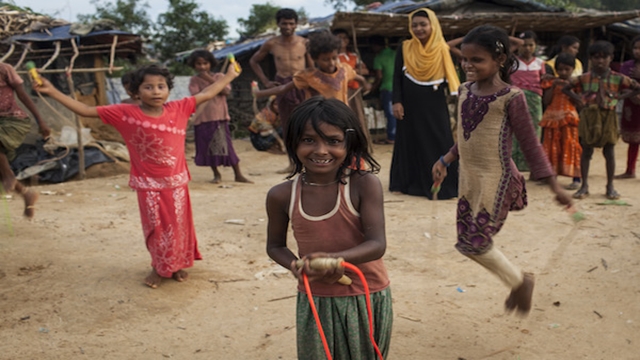SAM
Published:2018-05-08 19:44:14 BdST
Unicef gets $15.7m fund for Rohingyas in Cox’s Bazar
FT ONLINE
The United Nations Children’s Fund (Unicef) has scaled up humanitarian assistance and life-saving interventions for the Rohingya children and women along with the vulnerable host population in Cox’s Bazar with US$15.7 million funding received from the government of Japan.
Unicef, with its local partners, urgently activated emergency life-saving assistance since the crisis unfolded and called for global funding to respond to the crisis.
As estimated by the Inter-Sector Coordination Group, more than 671,000 people fled violence from the Rakhine State of Myanmar since 25 August 2017 and sought refuge in Bangladesh, said the Unicef on Tuesday.
Among them, more than 389,000 are children, generating one of the largest groups of displaced children in the world.
The government of Japan recognized the desperate needs of the refugee children and their families, as well as those who became vulnerable in the host communities in Cox’s Bazar due to massive influx and decided to assist the population.
Unicef has appealed for US$144.6 million in 2018 to respond to the refugee crisis in Cox’s Bazar area.
So far, Unicef has 30 per cent funding available against its 2018 appeal requirement. An additional US$100.8 million is required to fully deliver on the response.
This new grant will allow Unicef and its partners to continue providing child protection, healthcare, safe drinking water and sanitation support to refugee children and women and their families.
It will also open up opportunities for Unicef to include more people from the host communities and strengthen their resilience to cope with the challenges that entailed the refugee crisis.
The Ambassador of Japan to Bangladesh Hiroyasu Izumi said Unicef is playing a very important role in this crisis, especially for protection of women and children.
"Every child is entitled to have a dream and hope even when he/she is in a crisis. It is very important to save the children’s lives and their dream.”
Appreciating the much-needed support in the first six months of the crisis, Unicef Bangladesh Representative Edouard Beigbeder said Unicef Bangladesh is grateful to the Government and the people of Japan for their generous support during a time of immense crisis.
"With this new fund, we will be able to scale up our interventions to save more lives and continue with our ongoing support in providing safe drinking water and sanitation, healthcare to children, newborns and pregnant mothers, and strengthen resilience of the affected host population.”
The government of Japan has been supporting Unicef to provide emergency humanitarian assistance and life-saving interventions to refugee and host communities since the refugee influx began on 25 August 2017.
This renewed partnership between the government of Japan and Unicef will bolster ongoing programmes for the refugees and the host communities.
Unicef, with partners, has so far treated more than 15,000 children with severe acute malnutrition; provided psychosocial support to more than 142,300 children; and vaccinated 354,982 children with measles-rubella vaccines, 431,448 children against diphtheria, and 700,487 people against cholera.
Unicef-supported health facilities have so far provided healthcare to more than 53,000 children under five years of age.
With local partners and the Bangladesh Army, Unicef is now providing access to safe drinking water to 291,700 people and sanitation services to 392,250 people and aims to scale up the services further.
Nearly 90,000 children aged between 4 and14 years of age are now enrolled in 860 Unicef-supported learning centres.
Unauthorized use or reproduction of The Finance Today content for commercial purposes is strictly prohibited.


